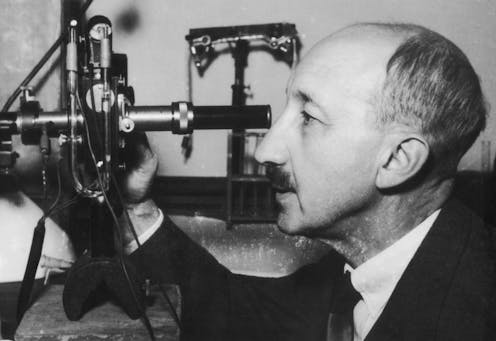
Home – Articles, Analysis, Opinion
Displaying 1651 - 1675 of 20109 articles

Some Nobel Prize-winning ideas originate in strange places, but still go on to revolutionize the scientific field. George de Hevesy’s research on radioactive tracers is one such example.

A new study of Florida’s fiscal vulnerability to climate change finds that flooding directly threatens many local tax bases.

Low levels of literacy cost the US more than $2 trillion every year.

Quantum dots are a prime example of the way nanotechnology engineers materials at an atomic scale.

Long gridlocked by fighting between the two major political parties, the US House is now split by conflict within the GOP, thanks in part to redistricting practices that boost extremism.

Did the Green Revolution, which brought high-tech agriculture to developing nations in the 1960s, prevent famine? Recent research takes a much more skeptical view.

The 2023 Nobel Prize in physics recognized researchers studying electron movement in real time − this work could revolutionize electronics, laser imaging and more.

The design philosophy of the everything app WeChat may seem paradoxical, being simultaneously pervasive and inconspicuous. But this idea of “everythingness” goes back to ancient Taoist philosophy.

Your cells die to keep you alive. Cell death does everything from fighting cancer cells and pathogens to forming your fingers and toes.

The Nobel Peace Prize has recognized some legendary leaders and peace activists, but it has a mixed track record of recognizing people who actually deserve the prize.

Thirty years after the Battle of Mogadishu, the US continues waging war in Somalia, with little public knowledge, scrutiny or constructive results.

As the Synod of Bishops meets in Rome, a Catholic theologian explains the preparations that went into the consultative process and what it says about Pope Francis’ vision for the future church.

Their desire to pursue marriage abroad not only reveals their longing for a better life but also reveals the pervasive gender, age and class inequalities that continue to plague modern-day China.

Three scientists won the 2023 Nobel Prize in physics for their work developing methods to shoot laser pulses that only last an attosecond, or a mind-bogglingly tiny fraction of a second.

Policymakers and others often invoke the 1957 Russian launch of sputnik when trying to spark a discussion about education reform. A rhetoric scholar examines how often they succeed.

The collapse of the self-proclaimed republic ushers in a new reality in the South Caucasus. For Armenia, the first concern is how to accommodate the needs of 100,000-plus refugees.

A scholar works to document a dialect of the Ojibwe language that was spoken by his grandmother in the Great Lakes region.

Republicans Mike Pence and Mitt Romney both spoke recently about the conservative ideals that animate their politics − and which Donald Trump has violated. Do voters care?

Popular culture often describes scalping − the forceful removing of a person’s scalp − as an indigenous practice. But white settlers accelerated this form of violence against Native Americans.

If an alert from the federal government popped up on your phone, did you notice it? Did you know who it was from? Did you trust it?

Superconductivity may sound like science fiction, but the first experiments to achieve it were conducted over a century ago. Heike Kamerlingh Onnes, credited with the discovery, won a Nobel Prize in 1913.

The Biden administration directed agencies to consider the cost of greenhouse gas emissions in their future purchasing and budget decisions. An example shows just how much is at stake.

Medieval monastics were often discouraged from owning companion animals, which were viewed as a distraction, a religion scholar explains.

The winners of the 2023 Nobel Prize in physiology or medicine made a discovery that helped create the COVID-19 vaccines. They couldn’t have anticipated the tremendous impact of their findings.

Current precedent relies on a 1982 case in which five justices generally agreed there were limits on a school’s power to ban books, but they didn’t agree on why.
